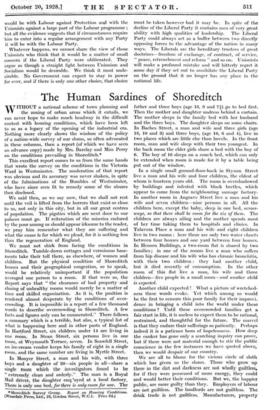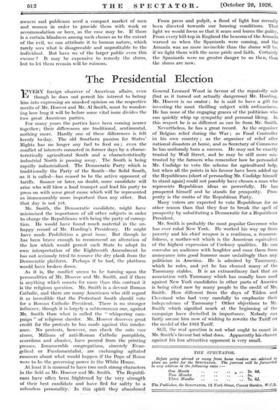The Human Sardines of Shoreditch
WITHOUT a national scheme of town planning and the zoning of urban areas which it entails, we can never hope to make much headway in the difficult contest with housing conditions, which have been left to us as a legacy of the opening of the industrial era. Nothing more clearly shows the wisdom of the policy of a nation-wide survey of our slums, so often advocated in these columns, than a report (of which we have seen an advance copy) made by Mrs. Barclay and Miss Perry on the conditions prevailing in Shoreditch.* This excellent report comes to us from the same hands that wrote the survey on the conditions in the Victoria Ward in Westminster. The moderation of that report was obvious and its accuracy was never shaken, in spite of the fulminations of the Bumbles of VVestminster, who have since seen fit to remedy some of the abuses then disclosed.
We said then, as we say now, that we shall not rest until the veil is lifted from the horrors that exist so close to us, not only in this city, but in all our great centres of population. The pigsties which are next door to our palaces must go. If reiteration of the miseries endured by the poor among us should appear irksome to the reader, we pray him remember what they are suffering and what the cause is for which we plead, for it is nothing less than the regeneration of England.
We must not shirk from facing the conditions in Shoreditch. Tumble-down cottages and verminous base- ments take their toll there, as elsewhere, of women and children. But the physical condition of Shoreditch houses and their geographical congestion, so to speak, would be relatively unimportant if the population averaged one person to a room. If that were so, the Report says that " the clearance of bad property and closing of unhealthy rooms would merely be a matter of time and skilled organization. As it is, the position is rendered almost desperate by the conditions of over- crowding. It is impossible in a report of a few thousand words to describe overcrowding in Shoreditch. A few facts and figures only can be enumerated." There follows a summary which is a terrible, but alas, a typical list of what is happening here and in other parts of England. In Hartford Street, six children under 14 are living in one room. In Stean Street, six persons live in one room, at Weymouth Terrace, seven. In Scawfell Street, an ice-cream vendor keeps his family of eight in a single room, and the same number are living in Myrtle Street.
In Monyer Street, a man and his wife, with three boys and a daughter of 20—six people in all—share a single room which the investigators found to be " extremely clean and orderly." The man is a Royal Mail driver, the daughter ernF'oyed. at a local factory, There is only one bed, for there is only room for one. The *Shoreditch Survey Group. Report on Housing Conditions. (Weardale. Press, Ltd., 26, Gordon Street, W.C.1. Price 2d.) father and three boys (age 13, 9 and 71) go to bed first. Then the mother and daughter undress behind a curtain. The mother sleeps in the family bed with her husband and the three boys. The daughter sleeps on some chairs. In Baches Street, a man and wife and three girls (age 18, 10 and 3) and three boys, (age 16, 6 and 4), live in two places which arc little else than hovels. In the front room, man and wife sleep with their two youngest. In the back room the elder girls share a bed with the boy of 6. The boy of 16 sleeps on a couch bed, which can only be extended when room is made for it by a table being put out of the window.
In a single small ground-floor-back in Stynan Street live a man and his wife and four children, the eldest of whom is fourteen years old. The room is overshadowed by buildings and infested with black beetles, which appear to come from the neighbouring sausage factory. In another room in Angrave Street live a man and his wife and seven children—nine persons in all. All the children here, except the baby, sleep in one bed, across- ways, so that there shall be room for the six of them. The children are always ailing and the mother spends most of her time taking them to hospitals and clinics. In Talavera Place a man and his wife and eight children live in two rooms : here there are only two water closets between four houses and one yard between four houses. In Henson Buildings, a two-room flat is shared by two families ; in one of the rooms live a man who suffers from hip disease and his wife who has chronic bronchitis, with their two children : they had another child, but it died recently of consumption. In the other room of this flat live a man, his wife and three children—five people in a small room—and another child is expected.
Another child expected ! What a picture of wretched- ness these words evoke. Yet which among us would be the first to censure this poor family for their improvi_ dente in bringing a child into the world under these conditions ? Until these overcrowded families get a fair start in life, it is useless to expect them to be rational, restrained, and thoughtful for the future. The marvel is that they endure their sufferings so patiently. Perhaps indeed it is a patience born of hopelessness. How deep the canker has gone only a searching inquiry can prove, but if there were not material enough to stir the public conscience in the few instances we have quoted above, then we would despair of our country.
We are all to blame for the vicious circle of sloth which has given us the slums. Those who grow up there in the dirt and darkness are not wholly guiltless, for if they were possessed of more energy, they could and would better their conditions. But we, the happier public, are more guilty than they. Employers of labour are not guiltless. The landlords are not guiltless. The, drink trade is not guiltless. Manufacturers, property owners and publicans need a compact market of men and women in order to provide them with work or accommodation or beer, as the case may be. If there is a certain blindness among such classes as to the extent of the evil, we can attribute it to human nature, which rarely sees what is disagreeable and unprofitable to the individual. But have we of the larger public even this excuse ? It may be expensive to remedy the slums, but to let them remain will be ruinous. From press and pulpit, a flood of light has recently been directed towards our housing conditions. That light we would focus so that it sears and burns the guilty. From every hill-top in England the beacons of the Armada warned us when the Spaniards were coming, and the Armada was no more invincible than the slums will be, if we fight them with the same pride and faith. Certainly the Spaniards were no greater danger to us then, than the slums are now.































































 Previous page
Previous page